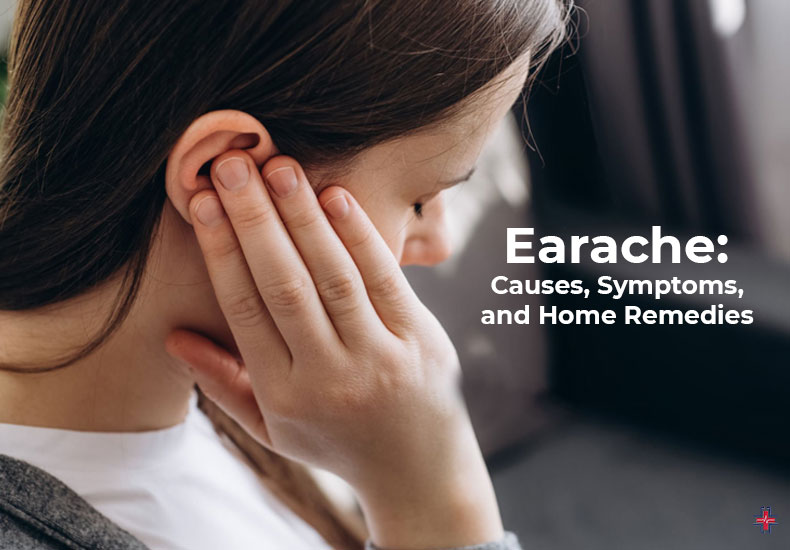You could experience an earache in one or both ears. However, it usually only affects one ear. The pain might be subtle, severe, or searing and can be continuous or intermittent.
In addition to experiencing a fever, an ear infection can cause temporary hearing loss. Young children with ear infections may exhibit fussiness and irritability. They might even rub or tug on their ears.
Continue reading for more signs, causes, remedies, and information.
What Is Earache?
One of the most frequent reasons we send our kids to the doctor is for earache (ear discomfort). We seek treatment for our aching ears. Earaches may indicate an underlying medical ailment or be a symptom of an ear infection. Ear pain or earache rarely indicates a serious illness. The cause determines the course of treatment.

Who’s Affected By Earache?
Almost anybody can have ear pain. On the other hand, ear pain is more common in younger children than in adults. According to one study, 80% of kids will suffer an acute otitis media middle ear infection by the time they are three.
Symptoms of Earache
Earaches can develop from ear infections or injuries. Symptoms in adults include:
- Ear pain
- Impaired hearing
- Fluid drainage from the ear
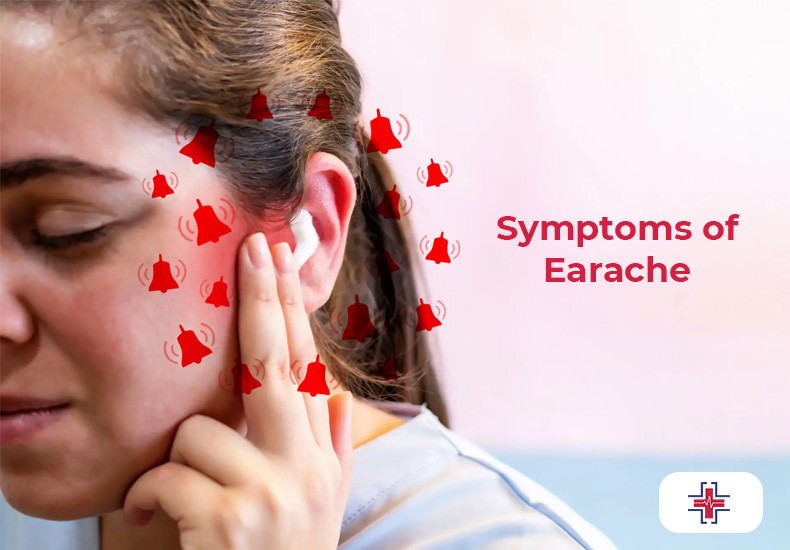
Children can typically show additional symptoms, such as:
- Ear pain
- Muffled hearing or difficulty responding to sounds
- Fever
- Sense of fullness in the ear
- Difficulty sleeping
- Tugging or pulling at the ear
- Crying or acting irritable more than usual
- Headache
- Loss of appetite
- Loss of balance
What Causes Earache?
Other than the infection or wounded site, ear pain is experienced elsewhere. For instance, ear pain could be associated with jaw or tooth pain.
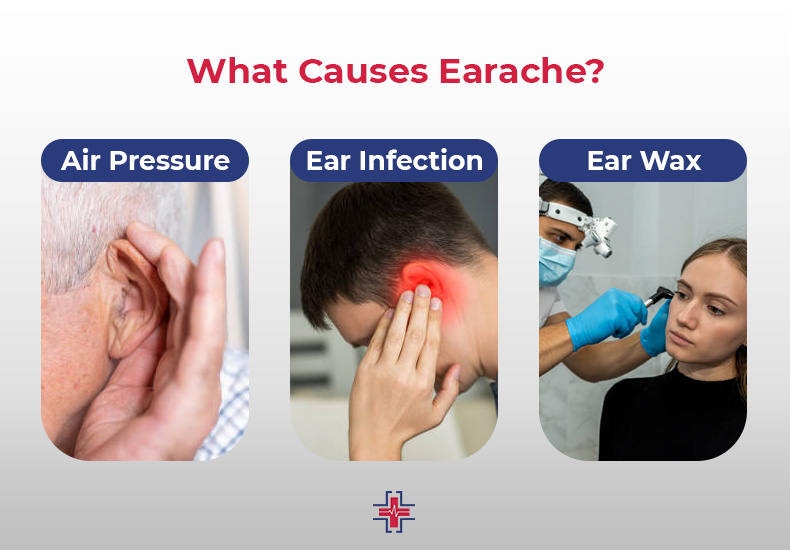
Earaches may be caused by:
Air Pressure
Your ear does a fantastic job of maintaining equal pressure on both sides of your eardrum most of the time. During swallowing, you may feel a slight snap. When you make quick adjustments, such as during an elevator ride or flight, you might lose your equilibrium. You may experience ear pain and hearing loss. Some people may develop chronic eustachian tube dysfunction as a result of this problem.
To stay out of trouble when flying:
- During takeoff and landing, chew gum, suck on hard candy, or yawn and swallow.
- As the plane lowers, keep your eyes open.
- After taking a big inhale and pinching your nose shut, gently try to blow air out of it.
- When you have a cold, sinus infection, or allergy symptoms, stay away from diving and flying.
Ear Infection
- A common cause of earaches and ear pain is ear infections. All three parts of the ear are susceptible to ear infections.
- Swimming, using headphones or hearing aids that harm the skin within the ear canal, and sticking fingers or cotton swabs into the ear canal can all result in an outer ear infection.
- An infection may result from scratches or irritations to the skin in the ear canal. The ear canal’s skin becomes softer when wet, which can encourage the growth of bacteria.
- Infections originating from a respiratory tract illness might result in middle ear infections. These infections can lead to an accumulation of fluid behind the ear drums, which can harbor germs.
- An inner ear condition known as labyrinthitis can occasionally result from bacterial or viral infections contracted from respiratory ailments.
Ear Wax
Every day, wax is produced and removed from your ear. An ineffective cleaning process results in gunk building up and solidifying in your ear canal. Your physician will refer to this wax as impacted. It hurts sometimes.
Never attempt to remove wax with cotton swabs or any other instrument. By forcing it deeper into your ear canal, you’ll only increase its chances of becoming impacted. You may experience pain, itching, discharge, or infection in your ear. You might experience temporary hearing loss.
OTC ear drops that soften wax and allow it to drain spontaneously can be used at home to treat slightly blocked ears. Or, if the wax has solidified, visit your physician.
Other Causes
Even when the source of your discomfort is elsewhere in your body, such as a toothache, you may still experience pain in your ears. This is a result of your face and neck nerves passing quite near to your inner ear. Referred pain is the term used by doctors to describe pain that originates in one location but is felt in another.
If you have a really painful sore throat along with your earache, it can be tonsillitis or pharyngitis. In actuality, the most severe sign of one of these illnesses is frequent earache. Find out more about the signs of a sore throat.
Ear pain can also be caused by cavities, impacted molars, and tooth abscesses. By tapping on a tooth or feeling your gums to see if they are sore, your doctor can determine whether your teeth are the cause. Study up on toothaches.
The “hinge” of your jaw that is situated just behind your ears is called the temporomandibular joint, or TMJ. Grinding your teeth can cause TMJ pain, or it could be an indication of arthritis. You eat, talk, or yawn, and then you get an ache in your face or ears. Apply warm compresses to your jaw and take over-the-counter pain medication to alleviate it. Refrain from clenching your teeth. Putting on a mouth guard while you sleep could be beneficial.
Serious conditions like tumors or infections like cellulitis or shingles can also cause ear pain. See your doctor as soon as possible for therapy and to rule out a more serious condition if your ear discomfort is severe, doesn’t go away after a few days of home treatment, is accompanied by a high fever, sore throat, or develops a new rash.
How Is Ear Pain Diagnosed?
A physician can identify ear pain by reviewing your medical history and symptoms. To identify the source of your ear pain, they will probably also use an otoscope—a light-wielding instrument—to inspect your throat, nose, and ears for redness and other signs.
A tympanogram, a rapid test that measures middle ear pressure, or an otoscope used to push a puff of air against the eardrum to determine if it’s moving normally can also be used by a doctor to identify an ear infection.
How Long Do Earaches Last?
The majority of the time, ear pain goes away on its own in a few days, so your doctor could decide to hold off on giving an antibiotic. Within two to three days of starting antibiotics for an infection, you should start to feel better.
Medical Treatment For Earaches
Your doctor can suggest over-the-counter (OTC) medications like ibuprofen (Advil, Motrin) or Tylenol (acetaminophen) treat ear pain. To ease the pain, your doctor might also suggest over-the-counter ear drops; however, you should never take these if there’s a possibility that the eardrum has ruptured.
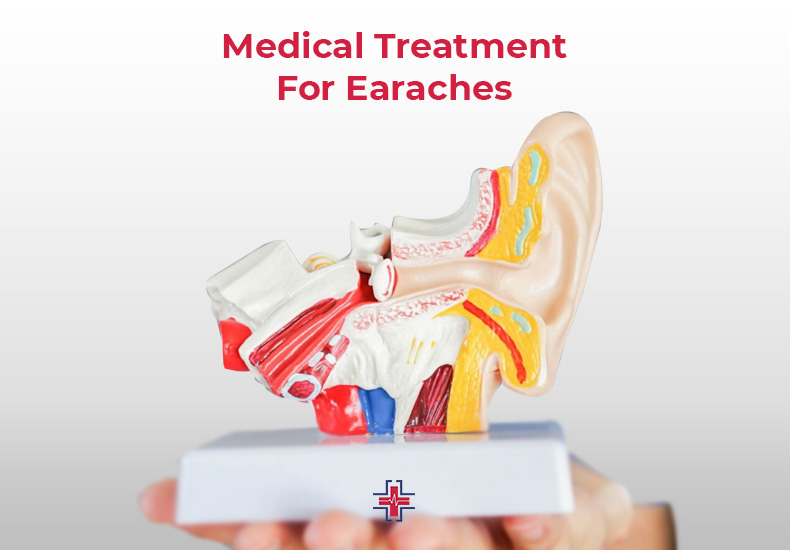
Although they are rarely required, antibiotics are occasionally administered for ear infections. Antibiotics like amoxicillin can be used to treat severe or persistent ear infections in children that don’t go away after a few days.
An earache may result from earwax accumulation in the ear canal. Nevertheless, never put anything in your ear, not even a cotton swab, since this will only cause the wax to become lodged in the ear rather than come out. A medical specialist should be seen for a diagnosis and treatment of excessive earwax.
Home Remedies for Earache
Natural chemicals used in home treatments could offer some assistance. But when it comes to their efficacy in comparison to over-the-counter drugs, there is no scientific proof.
It is preferable to visit a doctor if an earache persists for more than 24 to 48 hours. They can investigate whether the pain is being caused by an underlying issue.
Garlic
The Use of garlic as a natural earache cure dates back thousands of years. Garlic has a chemical called allicin, which may help treat bacterial infections that could be the cause of an earache.
It is claimed that eating raw garlic helps lessen earache. Garlic, however, may conflict with antibiotics, so before taking it, consult a physician.
Ear Dripping
Some people find success with over-the-counter (OTC) treatments, particularly those who have tried natural ways. People who have had tubes surgically installed in the past or whose eardrum has ruptured shouldn’t use many over-the-counter drugs.
To ensure that their preferred treatment won’t conflict with any presently prescribed medications, some people might also need to see their doctor.
Neck Workouts
Tensed muscles that press against the ear canal might occasionally be the source of an earache. If so, a few easy neck exercises could help reduce the pain.
For example, raise the shoulders toward the ears and slowly rotate the head and neck; repeat this movement many times a day.
Peroxide of Hydrogen
Earaches have long been treated naturally with hydrogen peroxide. After applying five to ten drops, rest on your side with the aching ear facing up for approximately ten minutes. Once drained, rinse with cold water over the sink. The bubbles shouldn’t worry you; they can aid in clearing the ear canal of ear wax.
What Essential Oils Are Good for Earaches?
Plant material is used to make essential oils. Consider them to be extremely concentrated versions of the plant they come from. Steaming plants or plant parts allows the oil to be extracted from the plant’s water content. The kind of plant the essential oil comes from and how it is extracted both affect its chemical composition.
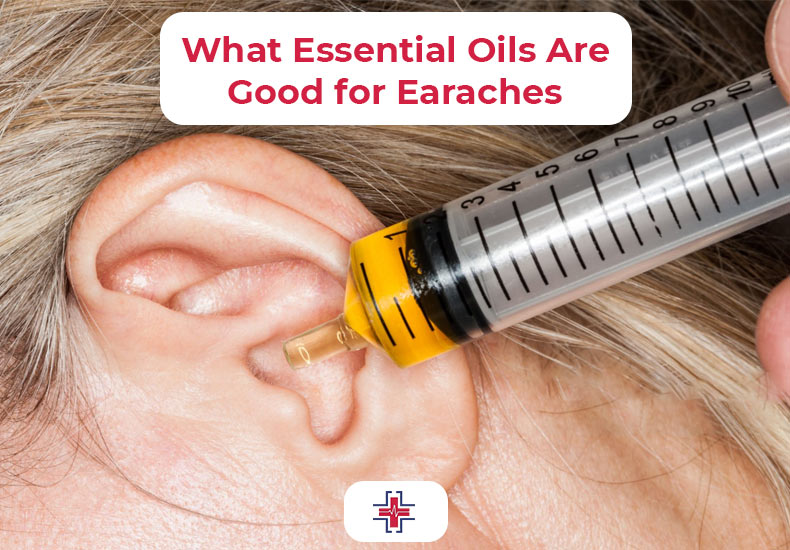
Certain essential oils can help prevent bacterial and viral illnesses because of their antimicrobial or antibacterial qualities. Viruses take control of your body’s cells to function. Subsequently, the virus multiplies by using your cells. Certain essential oils work by stopping the virus from multiplying, which can assist halt that process.
Certain essential oils function similarly to antibiotics, aiding in the destruction of pathogenic bacterial strands. The mechanisms by which different oils kill the germs vary. Some, for instance, can obstruct the biological functions that provide the bacteria with energy. As a result, the bacteria die from starvation and exit your system.
Sinus Infections and Earaches
Sinus infections and earaches are closely related health issues that often go hand in hand. The sinuses are air-filled cavities located within the bones of the face, and when these become inflamed or infected, they can lead to a condition known as sinusitis. Sinus infections commonly result from viral or bacterial infections, allergies, or anatomical factors. The proximity of the ear to the sinuses means that sinusitis can frequently cause earaches.
The Eustachian tubes, which connect the middle ear to the back of the throat, may become blocked or swollen during sinus infections, affecting ear pressure and causing discomfort. The pain experienced in the ear is often a secondary symptom of the underlying sinus issue. Individuals suffering from sinus infections may notice symptoms such as nasal congestion, facial pain, and headaches, while earaches can manifest as a feeling of fullness, popping sensations, or even temporary hearing loss. Seeking medical attention for proper diagnosis and treatment is crucial to alleviate symptoms and prevent complications.
Earaches and COVID
Earaches and COVID-19 share a complex relationship, as the virus can manifest in a variety of symptoms, including those affecting the ears. Some individuals with COVID-19 have reported experiencing ear-related issues, such as earaches, fullness, or a sensation of pressure. These symptoms may be associated with the virus’s impact on the respiratory system and its potential to cause inflammation in the nasal passages and throat.
Additionally, complications such as secondary bacterial infections or the body’s inflammatory response to the virus could contribute to ear discomfort. It is essential to note that earaches alone are not specific to COVID-19, and various other conditions can cause similar symptoms. If someone experiences earaches in conjunction with other COVID-19 symptoms or has been exposed to the virus, it is advisable to seek medical attention and get tested for COVID-19 to ensure appropriate care and timely isolation measures if needed.
Earaches and Sore Throat
Experiencing both earaches and a sore throat can be indicative of various underlying health issues, often related to respiratory infections. The ears, nose, and throat are interconnected, and infections affecting one area can easily spread to others. Earaches and sore throats commonly coexist due to shared connections like the Eustachian tubes and the proximity of the throat to the ears.
Respiratory infections, such as the common cold or flu, frequently lead to symptoms like throat irritation and ear discomfort. Infections caused by viruses or bacteria can trigger inflammation in the throat and may affect the Eustachian tubes, leading to earaches. Other factors, such as allergies or sinus infections, can also contribute to this tandem of symptoms. Seeking medical advice is crucial to identify the underlying cause and receive appropriate treatment, whether it be antibiotics for a bacterial infection or supportive care for a viral illness.
FAQs
Can Toothaches Cause Earaches?
Toothaches can cause earaches due to the proximity of the upper molars to the ear. Infections or inflammation in the teeth and surrounding gum tissue may lead to referred pain. Seeking dental care is crucial to address the underlying issue and alleviate both tooth and ear discomfort.
Are Earaches Contagious?
Earaches themselves are not contagious. They are symptoms of an underlying condition, such as an infection, which may be caused by bacteria or viruses. While the earache itself cannot be transmitted from person to person, the infectious agent responsible for the ear infection, such as bacteria or viruses, can be contagious. For example, a person with a viral or bacterial respiratory infection, like the common cold, may spread the infectious agents to others through respiratory droplets, potentially leading to ear infections in those who come into contact with the contagious person.
Is Olive Oil Good for Earaches?
Olive oil can be beneficial for earaches as it may help soften earwax, making it easier to remove. However, it’s essential to consult with a healthcare professional before using any home remedies to address earaches, especially if there is an underlying infection or other medical condition.
Are Earaches a Sign of Covid-19?
While earaches are not a common or specific symptom of COVID-19, some individuals with the virus may experience ear-related issues as part of a broader range of symptoms. If someone develops earaches along with other symptoms like fever, cough, or loss of taste or smell, it’s advisable to seek medical attention and consider getting tested for COVID-19.
Can Stress Cause Earaches?
Yes, stress can contribute to earaches as it may lead to muscle tension and changes in blood flow, affecting the ears. Chronic stress can exacerbate underlying conditions such as temporomandibular joint (TMJ) dysfunction, potentially causing ear discomfort.
Bottom Line
The majority of us will experience ear pain or an earache at some point in our lives. The most frequent causes of pediatric visits to their doctors are earaches and infections. Adults may have barotrauma from flying or temporomandibular joint conditions, among other common causes of earaches. Just because earaches are a common issue doesn’t mean you have to ignore them. However, earaches might worsen if they are not treated. Furthermore, earaches could indicate potentially dangerous underlying medical issues. Anytime you have concerns regarding earaches, discuss your ear health with a healthcare professional at the Affordable Urgent Care in Mesquite.
